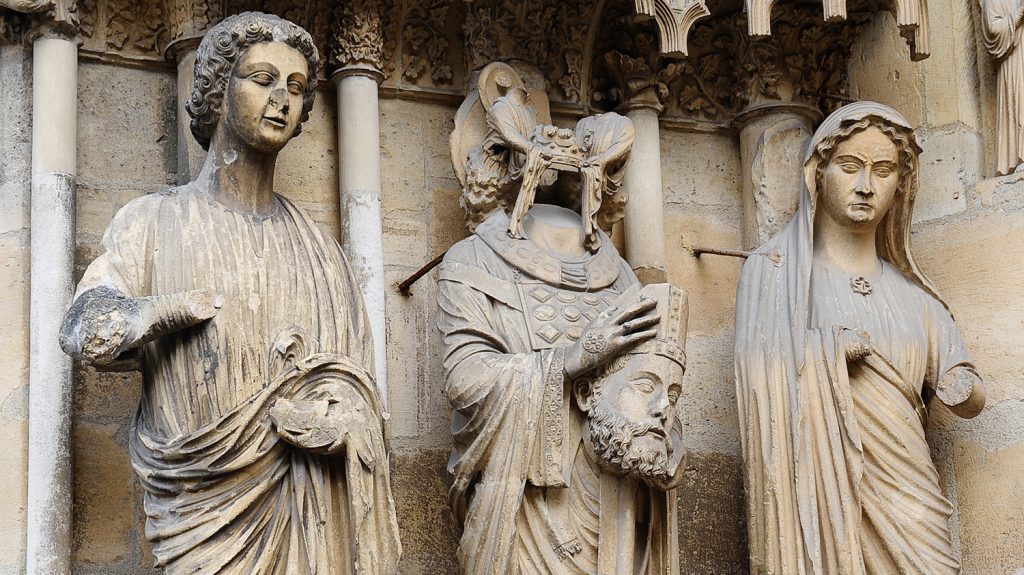Today is the feast of Nicasius of Rheims (above, centre), one of the great cephalophoric (head-carrying) saints, who was beheaded when the Vandals invaded France in the 4th century. At his execution, Nicasius insisted on reading Psalm 119 aloud, which was a brilliant delaying tactic, as it’s the longest psalm in the Bible by a mile. But the executioner grew impatient after 25 verses and took off Nicasius’s head as he was saying: ‘My soul clings to the dust…’ Determined not to have his reading interrupted, Nicasius, head lying on the ground, continued with the second half of the verse: ‘Revive me, Lord, with your words’.
Today in 1922, John Reith was hired to become the general manager of the newly formed British Broadcasting Company. Reith was the seventh child of a Scottish Presbyterian minister, and brought a sternly Christian approach to broadcasting on the wireless. Sundays on the BBC under his rule were strictly Puritan, with radio silence in the morning and early evening, to protect the audience from the temptation of skipping Church.
It is the feast of St Spyridon, a shepherd who became Bishop of Tremithous in Cyprus, but carried on being a shepherd (of actual sheep). He and his deacon travelled to the Council of Nicea in the year 325 on two mules, a white and a chestnut. One night, as they stayed at a roadside inn, some rival bishops, who feared Spyridon’s simple piety and magnetic personality, tried to stop him in his tracks. Before dawn, they cut off the heads of his mules, and then set off towards Nicea. When Spyridon found the mules, he got his deacon to place the heads back on the bodies in the dark, made a sign, and the mules staggered to their feet. As day broke, they passed the rival bishops, who were astonished to see the mules alive, and flabbergasted that the white mule had a chestnut head, and the chestnut a white head.
‘Saint Spiridion was the patron saint of the island. His mummified body was enshrined in a silver coffin in the church, and once a year he was carried in procession round the town. He was very powerful, and could grant requests, cure illness and do a number of other wonderful things for you if he happened to be in the right mood when asked. The islanders worshipped him, and every second male on the island was called Spiro in his honour.’ Gerald Durrell, My Family and Other Animals
St John of the Cross, the Spanish mystical theologian and poet, died today in 1591, in the monastery of Úbeda, Andalusia. A Carmelite friar, he was imprisoned and tortured by his fellow friars when he and his friend Teresa of Ávila tried to bring reform to their religious communities. Out of his hard experiences, he wrote spiritual works of great depth and beauty, including his celebrated poem, La noche oscura del alma (‘Dark night of the soul’), and his book, Ascent of Mount Carmel.
On a dark night
aflame with love and longing
(O happy chance!)
I slipped away unseen,
while my house was gently sleeping.
John of the Cross, ‘Dark Night of the Soul’
Thomas Tenison, the Archbishop of Canterbury who put the English and British crowns on the heads of Queen Anne and King George I, died today in 1715. Earlier in his life, when he was Vicar of St Martin-in-the-Fields, he preached the funeral sermon of Nell Gwyn, the famous mistress of King Charles II. As requested by her, his sermon took its text from Luke chapter 15, verse 7: ‘I say unto you, that likewise joy shall be in heaven over one sinner that repenteth, more than over ninety and nine just persons, which need no repentance.’
Image: Geert Schneider / CC BY 2.0
